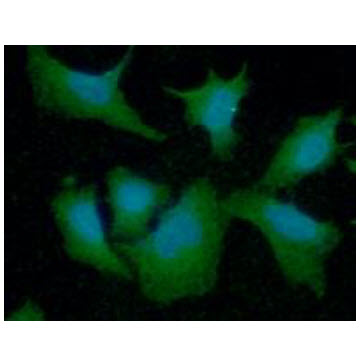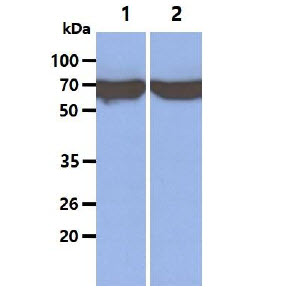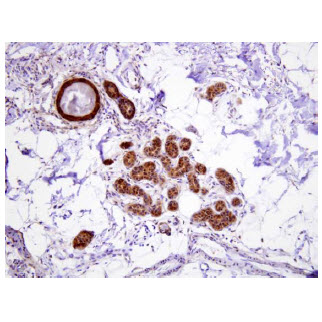Product Information
- Product Type
- Monoclonal Antibody
- Clone Number
- 4E7
- UniProt No.
- P0DMV8
- NCBI Accession No.
- NP_005336
- Alternative names
- Heat shock 70kDa protein 1A, Heat shock protein family A member 1A, HSP70, HSP70.1, HSP70-1/HSP70-2, HSPA1, HSPA1A, HSPA1B
Product Specification
- Host
- Mouse
- Reacts With
- Human
- Concentration
- 1mg/ml (determined by BCA assay)
- Formulation
- Liquid in. Phosphate-Buffered Saline (pH 7.4) with 0.02% Sodium Azide, 10% glycerol
- Immunogen
- Recombinant human Hsp70 (1-641aa) purified from E. coli
- Isotype
- IgG1 kappa
- Purification
- By protein-G affinity chromatography
- Applications
- ELISA, WB, ICC/IF, IHC
- Usage
- The antibody has been tested by ELISA, Western blot, ICC/IF and IHC analysis to assure specificity and reactivity. Since application varies, however, each investigation should be titrated by the reagent to obtain optimal results.
- Storage
- Can be stored at +2C to +8C for 1 week. For long term storage, aliquot and store at -20C to -80C. Avoid repeated freezing and thawing cycles.
Data
Immunocytochemistry/Immunofluorescence (ICC/IF)
ICC/IF analysis of HSP70 in A549 cells line. The cell was stained with AHS0703 (1:100). The secondary antibody (green) was used Alexa Fluor 488. DAPI was stained the cell nucleus (blue).
Western blot analysis (WB)
The Cell lysates (40ug) were resolved by SDS-PAGE, transferred to PVDF membrane and probed with anti-human Hsp70 antibody (1:1000). Proteins were visualized using a goat anti-mouse secondary antibody conjugated to HRP and an ECL detection system.
Lane 1.: 293T cell lysate
Lane 2.: HeLa cell lysate
Lane 1.: 293T cell lysate
Lane 2.: HeLa cell lysate
Immunohistochemistry (IHC)
Paraffin embedded sections of human eccrine gland were incubated with anti-human Hsp70 (1:100) for 2 hours at room temperature. Antigen retrieval was performed in 0.1M sodium citrate buffer and detected using Diaminobenzidine (DAB)
Note: For research use only. This product is not intended or approved for human, diagnostics or veterinary use.


